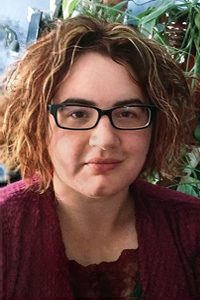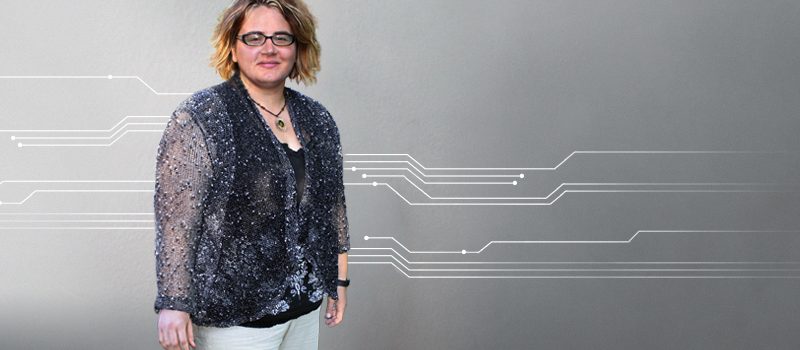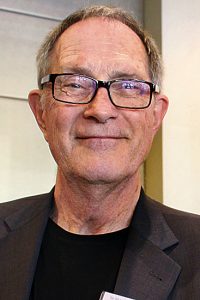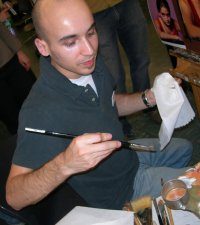Kameron Hurley: Building the Story of Ourselves
 There is a theory that storytelling is how we create our consciousness. This is why we can’t remember being infants. We only pick up the ability to remember events when we’re two or three years old – about the same time we figure out how to construct narrative. Once we can tell stories about the world and ourselves, we become truly conscious.
There is a theory that storytelling is how we create our consciousness. This is why we can’t remember being infants. We only pick up the ability to remember events when we’re two or three years old – about the same time we figure out how to construct narrative. Once we can tell stories about the world and ourselves, we become truly conscious.
So if the stories we tell about ourselves create who we are at this fundamental level… then the stories we tell ourselves are more than intangible thought. They are at the very core of who we become and who we perceive ourselves to be.
That’s why those days where we sit around berating ourselves about how dumb and worthless we are can be so dangerous. It also means the days we talk ourselves up hold extraordinary promise.
A while back, I went to a talk from a guy who introduced himself as an ultra-marathon runner. About halfway through his talk he revealed he was actually running his first ultra-marathon at the end of the month. I was a little annoyed at this. Why would you call yourself an ultra-marathon runner before you have run your first race?
He said, “On the days I don’t want to run, I have a trick for getting myself out the door to train. I say ‘I’m a runner. What would a runner do?’ And the answer is that a runner would run. So I run. Whenever I have a goal, I take on the identity of someone who has achieved that goal before I even begin. By taking on the identity, it helps drive me to take the action.”
This got me thinking about my trick of going to conventions and doing speaking engagements. I’m naturally introverted, and social events take a lot of energy and preparation for me. I’ve found, though, that if I tell myself, “I am playing the role of a famous author,” then it’s a lot easier to attend and speak at these events.
When I’m on a panel, or at the bar, or in conversation, and I’m stuck for what to say, I think, “What would a famous author do?” and the answer is a famous author would be totally confident, would be generous and interested in asking people questions, would be gregarious and tell jokes and ask people about their work and just generally have a great, confident, easy-going time, because hey, they are famous and successful and have no cares in the world.
Weirdly, this “cosplaying a famous writer” thing works for me. I tell myself a story. I play the part.
I do know that this “fake it ’til you make it” mentality is easier for privileged people, for sure. It’s much easier for, say, white men who’ve been told their whole lives that they are special, by culture and by media, to fake this. That doesn’t mean the rest of us can’t do it. It just means it may feel unnatural and silly and arrogant at first.
When you take on the identity of the person you want to be, it can also drive your decision-making process. When I say, “I’m a writer,” and I’m not writing, I feel like I’m lying to myself, so it drives me to write. When I look at my weekend ahead and think, “What would a writer do?” the answer is, write.
So I write.
What happens, though, when we get too comfortable with a lie? When we convince ourselves that we are just too tired, too old, that we don’t have enough time?
Then it’s time to interrogate that story.
I recently started a daily journaling routine where I note what I ate, read, drank, wrote, and how I spent my time, generally, at my day job or playing video games or working out. This gives me a high-level view of where my time is going, and how I’m really living, because lately the stories I’ve been telling myself about who I am aren’t lining up well with my actual life and habits.
This is the danger of building a false story of ourselves, a story that says, “You are already working hard. Your days are so full. You eat great. You’re drinking in moderation. Everything is fine!”
Reader, sometimes everything is not fine.
This works for so many things. I’ve reworked my life a few times now, and some of that took extraordinary bravery for somebody like me. Getting a one-way ticket to Alaska, and later, South Africa, was kind of a crazy thing to do, in retrospect, but I had this idea of the sort of person who I wanted to be. I would read the bios of other authors while sitting in my parent’s spare bedroom at 19 after leaving a disastrous relationship and think, “I want to have a really cool, interesting author bio like that. I want to have traveled the world and have done interesting things. I want to be a brave, interesting person.”
It was looking out at life, and seeing the kind of life I wanted, and who I wanted to be, that drove all my subsequent decisions. Nobody else in my life understood why I traveled so much, or pushed so hard. But I knew. I kept a vision in my head of the sort of life I wanted to have, of the person I wanted to become, and it powered me forward.
I don’t want to go all Oprah on you here, because the Power of Positive Thinking won’t save you from things like cancer or a terrible government. It certainly didn’t save me from getting a chronic illness, or from being effectively homeless and broke for a while. But having a goal in mind, having a story that I could tell myself about the life I wanted to have, helped me make the decisions that would eventually build that narrative.
Our lives present us with a series of doors. Knowing which to choose relies heavily on what your end goal is. I spend far more time considering career decisions now, working backward from a vision I have of the writing career and larger life I want.
Even now I find myself revisiting my own narrative because being “a writer” isn’t really enough of an identity for me, anymore. I want to be a writer, sure, but also a boxer, a gardener, a crafter, a gamer, a hiker. I want to be in good shape, have fewer low days, and achieve my goal of finding a house on a great deal of land in a country with decent health care.
That’s the story I need now, one more narratively complex than “be a writer,” but less broad than simply, “be a winner.”
What stories are you telling about yourself? Are you a fighter, a survivor, a runner, a champion? Those are all good narrative stories that you can build a life around, for a while. Pursue that story, build that life – but be mindful that when you get there, that’s really who you want to be… and really how it all turned out.
Because I never did follow up to see if that self-described “ultra-marathon runner” really ran that ultra-marathon. I sure hope he did, because however much power I put into narrative, stories are just stories, until we make them real through our actions.
Let’s start running.
This feature and more like it in the October 2018 issue of Locus.
 While you are here, please take a moment to support Locus with a one-time or recurring donation. We rely on reader donations to keep the magazine and site going, and would like to keep the site paywall free, but WE NEED YOUR FINANCIAL SUPPORT to continue quality coverage of the science fiction and fantasy field.
While you are here, please take a moment to support Locus with a one-time or recurring donation. We rely on reader donations to keep the magazine and site going, and would like to keep the site paywall free, but WE NEED YOUR FINANCIAL SUPPORT to continue quality coverage of the science fiction and fantasy field.








